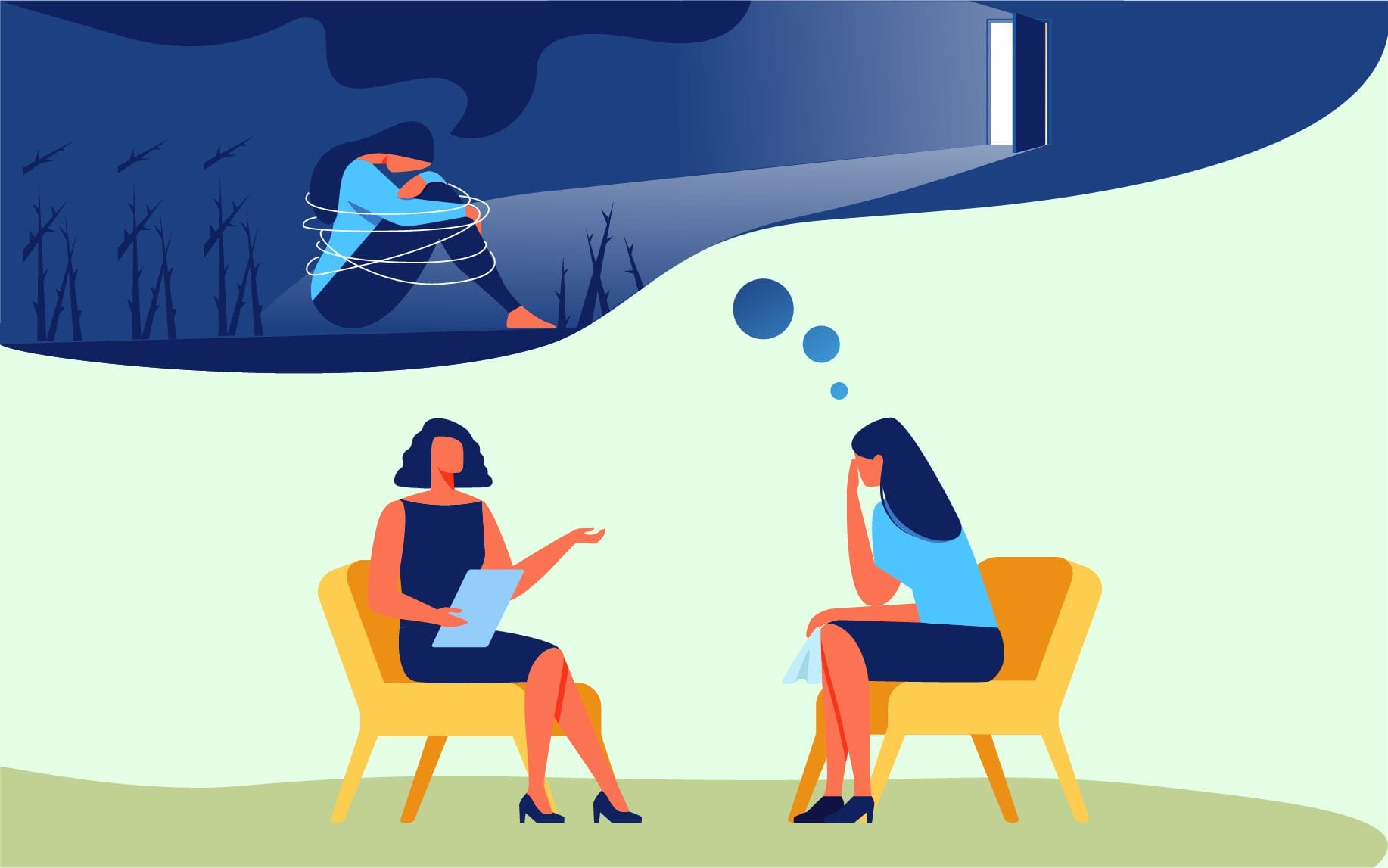The Role of Psych Therapy in Managing Anxiety and Anxiety
Psychotherapy has actually arised as a cornerstone in the administration of stress and anxiety and anxiety, offering customized interventions that vary from Cognitive-Behavioral Treatment (CBT) to mindfulness-based techniques. These methods not just assist people in identifying and reorganizing unfavorable idea patterns however also foster present-moment recognition, minimizing the propensity to ponder.
Comprehending Anxiety and Anxiety
Understanding anxiousness and anxiety requires a comprehensive appearance at these prevalent psychological health and wellness conditions, which typically coexist and significantly influence an individual's everyday life. Conversely, clinical depression manifests as a prevalent feeling of sadness, sadness, or vacuum, commonly gone along with by a loss of rate of interest in formerly taken pleasure in activities, changes in hunger, and sleep disruptions.
The conjunction of stress and anxiety and clinical depression can aggravate signs and make complex medical diagnosis and therapy. People experiencing both conditions may experience much more severe symptoms, higher impairment in job-related and social performance, and a much longer duration of illness. This comorbidity requires a nuanced understanding and strategy to treatment.
Cognitive patterns like unfavorable reasoning and maladaptive habits can bolster these conditions. Comprehensive assessment by mental health and wellness specialists is important to recognize the existence and degree of these problems, leading the means for customized restorative strategies.
Kinds Of Psychotherapy
Psychotherapy, additionally recognized as talk treatment, encompasses a range of therapy modalities made to reduce signs of stress and anxiety and anxiety by attending to the underlying mental and emotional concerns. Different kinds of psychotherapy are tailored to satisfy the unique requirements of individuals, supplying a series of techniques to psychological healthcare.
One widely made use of form is psychodynamic therapy, which focuses on understanding and solving unconscious problems stemming from very early life experiences. By discovering these deep-seated concerns, individuals obtain insight into their current behavior and emotion.
Social Therapy (IPT) is an additional effective technique that focuses on boosting interpersonal partnerships and social functioning to decrease depressive signs. It typically attends to concerns such as grief, role shifts, and social disputes.
Humanistic therapies, such as Client-Centered Therapy, stress personal development and self-actualization. Best Psychologist in Delhi. These approaches create a supportive setting where people can discover their sensations and create a stronger feeling of self
Finally, Dialectical Habits Therapy (DBT) incorporates cognitive-behavioral methods with mindfulness techniques. Initially developed for borderline character disorder, DBT has actually been adjusted to deal with anxiousness and clinical depression by training skills in distress resistance, psychological law, and social performance.
These varied psychotherapeutic approaches offer multiple paths to psychological wellness and health, accommodating therapeutic demands and specific preferences.
Cognitive-Behavioral Treatment (CBT)
Amongst the various psychotherapeutic methods, Cognitive-Behavioral Therapy (CBT) stands out for its organized, goal-oriented strategy in treating stress and anxiety and depression. Established by Aaron T. Beck in the 1960s, CBT is predicated on the concept that maladaptive reasoning patterns contribute considerably to psychological distress and behavior problems. By recognizing and restructuring these adverse idea patterns, CBT aims to alleviate signs and symptoms and foster healthier cognitive procedures.
CBT is typically temporary, extending 12 to 20 sessions, and involves a collaborative initiative between specialist and patient. The treatment incorporates a variety of methods, consisting of cognitive restructuring, direct exposure treatment, and behavioral activation. Cognitive restructuring concentrates on challenging and changing distorted cognitions, while direct exposure treatment gradually adjusts individuals to anxiety-provoking stimulations, decreasing avoidance behaviors. Behavioral activation looks for to raise engagement in rewarding activities to combat depressive states.
Empirical proof emphasizes the efficiency of CBT, with numerous studies showing its performance in lowering signs and symptoms of anxiety and anxiety. This restorative method has been adapted for numerous populaces and setups, verifying flexible and versatile. Its organized nature, empirical support, and concentrate on skill acquisition make CBT a cornerstone in the psychotherapeutic treatment of stress and anxiety and anxiety.
Mindfulness-Based Methods
Mindfulness-Based Techniques have actually amassed substantial focus in current years as efficient treatments for stress and anxiety and clinical depression. Rooted in ancient meditation practices, these techniques intend to cultivate a heightened recognition of the existing moment, which can help people disengage from the ruminative idea patterns often linked with stress and anxiety and depressive disorders.

In A Similar Way, Mindfulness-Based Cognitive Therapy (MBCT) incorporates principles from Cognitive-Behavioral Therapy (CBT) with mindfulness approaches. MBCT is specifically effective in preventing regression in people with persistent clinical depression. By acknowledging early warning indications of depressive episodes, people trained in MBCT can apply mindfulness techniques to alleviate the start of full-on episodes.
Benefits of Psychotherapy
Numerous researches have actually shown the profound advantages of psychiatric therapy for people grappling with stress and anxiety and clinical depression. Psychotherapy outfits individuals with coping strategies to handle stressful feelings, therefore minimizing signs and symptoms of anxiety and depression.
In addition, psychotherapy gives an organized environment for self-exploration and insight. By reviewing their experiences and sensations with a trained therapist, people can reveal underlying concerns adding to their psychological health and wellness battles. This self-awareness is an essential step towards long-lasting healing and durability.
One more considerable advantage is the improvement of interpersonal abilities. Anxiousness and clinical depression typically stress partnerships, resulting in isolation. With healing treatments, clients find out reliable interaction and conflict-resolution skills, which can enhance their communications and foster supportive relationships.
Additionally, psychotherapy supplies a tailored method to therapy. Inevitably, the advantages of psychiatric therapy expand past symptom alleviation, contributing to overall well-being and top quality of life.

Conclusion
Psychotherapy dramatically contributes to the administration of stress and anxiety and anxiety by supplying effective coping techniques and a safe atmosphere for self-exploration. Techniques such as Cognitive-Behavioral Treatment (CBT) and mindfulness-based approaches are critical in determining and reorganizing negative thought patterns, go to my site while promoting present-moment awareness. These tailored interventions not just relieve signs and symptoms but also enhance emotional policy and interpersonal skills, thus improving general wellness and lifestyle for people dealing with these psychological health and wellness difficulties.
Psychotherapy has arised as a cornerstone in the administration i thought about this of stress and anxiety and anxiety, offering tailored interventions that range from Cognitive-Behavioral Treatment (CBT) to mindfulness-based techniques.Comprehending stress and anxiety and anxiety requires a comprehensive appearance at these common mental health problems, which frequently exist side-by-side and dramatically impact a person's day-to-day life.Among the various psychotherapeutic modalities, Cognitive-Behavioral Treatment (CBT) stands out for its organized, goal-oriented strategy in dealing with anxiousness and anxiety.Numerous researches have demonstrated the extensive benefits of psychotherapy for individuals grappling with stress and anxiety and anxiety. Psychiatric therapy gears up people with dealing approaches to handle distressing emotions, therefore reducing signs and symptoms of anxiety and clinical depression.